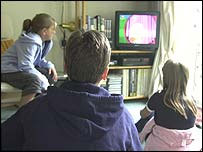TV 'linked to
short-sightedness'
8 July, 2004
Watching too much television may be to blame
Watching too much television and spending too long in front of a computer is
behind rising rates of short-sightedness, say scientists.
say scientists.
Australian researchers examined rising rates of short-sightedness in Asia.
Countries like Japan and Singapore have seen a sharp increase in cases in
recent years. Some experts say genes are behind the rise.
But the researchers found people's lifestyle was to blame, according to a
report in New Scientist magazine.
They said the findings may also explain rising rates of short-sightedness in
other parts of the world.
High rates
East Asia has much higher rates of short-sightedness or myopia than other
parts of the world.
In Singapore, 80% of 18-year-old men recruited to the army are
short-sighted. This compares with 25% just 30 years ago.
There has also been an increase in the number of people with extreme myopia,
which can lead to blindness.
As kids spend more time indoors, on computers or watching telly, we are
going to become just as myopic
Ian Morgan
Police and other employers are having problems finding people who meet their
requirements for good sight.
Ian Morgan and colleagues at the Australian National University in Canberra
reviewed 40 studies.
They found no evidence to support the theory that genes were behind the
rising rates of myopia in East Asia.
For instance, they found that while 70% of 18-year-old men of Indian origin
living in Singapore have myopia, it only affects 10% of those living in
India.
Similarly, 80% of 14 to 18-year-old boys in religious schools in Israel,
which have a strong emphasis on reading religious texts, have myopia.
This compares to just 30% of those in state schools, where there is no such
emphasis.
The researchers said their findings, originally published in the American
Journal of Human Genetics, point to lifestyle factors rather than genetics.
West affected
They warned that western countries are also set to see rates of myopia rise
in the years ahead.
In Sweden, 50% of 12-year-old children are short-sighted. That is expected
to be 70% by the time they are 18.
"As kids spend more time indoors, on computers or watching telly, we are
going to become just as myopic," said Ian Morgan.
Professor Bernard Gilmartin, director of research at the Neurosciences
Research Institute at Aston University in Birmingham, welcomed the study.
"The findings relate to what we call school myopia which has a classic onset
of nine or 10 years of age," he told BBC News Online.
"He is saying that who ever you expose to urbanisation or the education
background associated with modern life, the chances are they will become
myopic."